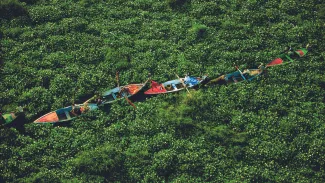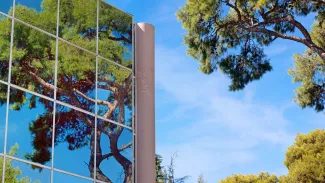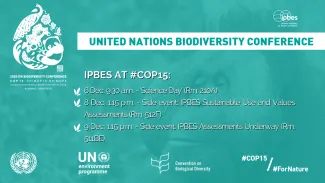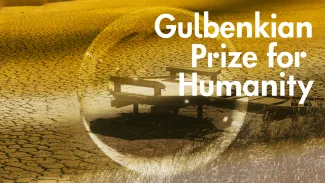
Launch of the "Summary For Policy Makers" of "The 1st Brazilian Assessment on Biodiversity and Ecosystem Services"
The recently-launched Brazilian Platform for Biodiversity and Ecosystem Services (BPBES) Report was inspired by and structured along the lines of IPBES assessments, exemplifying the impact of the work that IPBES is doing.
IPBES commends the efforts of BPBES working to protect this biodiversity hotspot of global importance. As the Report makes clear, the impact of biodiversity loss in Brazil can be felt far beyond its borders.
Learn more about BPBES and read their full press release here (in English): https://www.bpbes.net.br/en/press/
The Summary for Policymakers is available for download here (in Portuguese): https://www.bpbes.net.br/produto/diagnostico-brasileiro-sobre-biodiversidade-e-servicos-ecossistemicos/
Biodiversity is not a problem, it's a solution!
This is the main message of the "First Brazilian Assessment of Biodiversity and Ecosystem Services", which reveals why conservation and sustainable use of the country's environmental assets should be central, transversal and strategic elements - not appendices or obstacles - in the socioeconomic development of Brazil.
Launched on the 8th of November 2018, and signed by more than 100 scientists, the document is the most complete survey on the theme ever carried out in Brazil.
Rio de Janeiro, November 8, 2018 – Nine days before the start of the 14th Conference of the Parties to the Convention on Biological Diversity (CBD), to be held in Egypt from 17 to 29 Nov., and within two months before the new Brazilian president and State governors take office, the launch of the "Summary for Policymakers" from the "First Brazilian Biodiversity and Ecosystem Services Assessment" marks a moment as critical as appropriate for the sustainable development agenda in the international and domestic conjuncture. Globally, the eyes always turn to Brazil which, being the holder of the greatest biodiversity on the planet, plays a central role in macro-discussions, and the countries’ decline of biological wealth has a large impact beyond its borders. The political scenario of the country, with alternating mandates that will occur in the executive and legislative powers, also points to a range of possibilities and directions, depending on the decisions of the new government plans and proposals to be guided and approved in Congress.
The Summary for Policymakers is a document that aims to support decision making in the public and private spheres and brings the main results consolidated in the First Assessment, prepared by a group of more than 120 researchers gathered in the Brazilian Platform for Biodiversity and Ecosystem Services/BPBES. Ecosystem services are the benefits provided by nature that sustain life on the planet, such as clean water, fresh air, food, energy, pollination, climate regulation and protection against natural disasters, leisure and even cultural assets and emotional values. Therefore, the impact of the loss of biodiversity on the quality of life is great, as well as the pressing challenge of showing society the importance of these services provided by the natural systems for the human being.
"The elaboration of a document of this magnitude for Brazil has a global repercussion for the relevance that the country has in this theme and is a remarkable step for the recognition of the Platform and to influence the decision makers, especially at the moment in which we are living, for it is an exempt report," says former Federal Deputy and State of São Paulo Secretary of Environment Fábio Feldman, holder of the Global 500 Roll of Honor UN prize.
Carlos Joly, Professor at the State University of Campinas/UNICAMP, Co-Chair of BPBES and former Co-Chair of the IPBES Multidisciplinary Expert Panel/MEP, reveals that the document reinforces the results that are being pointed out since 2005 by the Millennium Ecosystem Assessment, the first analysis of the health of the planet's ecosystems. “Since 2005 it is clear that human activities, mainly land use change and climate change, are the main drivers of biodiversity loss, whether due to loss of habitat, pollution, invasive species or over exploitation. And the realization of the First Brazilian Assessment of Biodiversity and Ecosystem Services confirms that this scenario is also a reality in Brazil and that has been accentuating very fast, perhaps because we are precisely the country with the highest biodiversity on the planet," he explains.
Megadiversity threatened - The continental dimension provides Brazil with a great spatial heterogeneity and natural resources. It is estimated that the country is home to 42,000 plant species and about 9,000 vertebrates, including high rates of endemism, i.e. species that only exist in its territory. There are around 130,000 species of invertebrate known by science, but the estimates of the total number are not precise.
In addition, Brazil has a cultural diversity that is as rich as its biological assets. The country is home to more than 500 natural sacred sites associated with multiple cultural events. According to the Brazilian Institute of Geography and Statistics/IBGE, almost 900,000 indigenous people, who are divided among 305 ethnic groups and speak at least 274 languages, live in the country. Traditional communities (such as caiçaras, quilombolas, rubber tappers, riverine population, babassu nut breakers, pantaneiros, among others) comprise at least 5 million Brazilians and occupy approximately 1/4 of the country’s territory.
Indigenous people and traditional communities depend directly on nature to maintain their ways of life and culture, and for this reason they have a rich knowledge of the dynamics of nature and of man-nature interactions. Such peoples are holders of knowledge and practices, about agrobiodiversity, fishing, fire management, natural medicine, among others of commercial, cultural and spiritual value. Although some of these practices and knowledge are millennia-old, they are not known by society in general. "Incorporating indigenous and traditional knowledge about Brazilian biodiversity into the day-to-day life of society represents a great opportunity," explains Mercedes Bustamante, Professor at the University of Brasilia/UnB, Member of the Steering Committee of BPBES and former CLA of Chapter 4 of IPBES Regional Assessment of the Americas.
According to her, in the last two decades the Brazilian biomes have undergone critical changes, resulting both from the impacts of poorly planned human activities and from natural disasters that cause increasing losses of biodiversity and ecosystem services, which, in turn, have a direct impact on the economy and human well-being
The National List of Endangered Species includes 1,173 species of animals and 2,118 of plants. Bustamante points out that changes in land use that generate conversion and fragmentation of natural habitats for the introduction of new environments (mainly agricultural and urban areas) are among the main factors of biodiversity loss and environmental degradation in Brazil. She points out, however, that other direct vectors of pressure add to this context, such as climate change, pollution and biological invasion. "For this reason, the conservation and management of natural resources demand an articulation between different sectors of the economy and of society to guarantee the basis of sustainable development for Brazil", warns Bustamante.
Bipolar governance - According to the authors of the Diagnosis, governance of biodiversity and ecosystem services in Brazil is bipolar. If, on the one hand, the country has strong and capable institutions, on the other, there are problems of infrastructure, slow processes, legal, social and ecological conflicts and inefficiency in actions. Carlos Joly also notes that Brazil has a dubious position regarding international agreements. "It is a protagonist abroad, as was the case in Nagoya, when the Aichi Targets were established, and in the world climatic discussion of the Paris Agreement. It gave great support in the discussion of the Sustainable Development Objectives, which were born in RIO + 20 in 2012. However, internally the country does exactly the contrary to the principles established in those agreements. Brazil is in a process of systematically dismantling its environmental policy,"Joly points out.
The document also stresses that natural resources are treated within the framework of sectoral policies. "Biodiversity and ecosystem services are perceived as an obstacle or at most an appendage to the development process when, in fact, they form the basis of gaining competitiveness in a global environment," according to one of the points of the Diagnosis. The report warns that the form of governance over land directly affects biodiversity and ecosystems with consequences for the well-being of Brazilians. "The decisions and the way they are made determine the current and future state of the environment. Therefore, one of the main challenges for Brazil in the coming years is the alignment of development policies, especially agricultural policy, with the use and conservation of biodiversity. In addition, the restoration of native ecosystems emerges as a promising strategy to mitigate, and in some cases, reverse the effects of environmental degradation, but still lacks appropriate mechanisms and policies for its effectiveness,"says Bustamante.
Opportunity with expiration date - Still, according to the document, the window of time and opportunities to consolidate the basis of a sustainable future in Brazil is limited. It requires placing biodiversity and ecosystem services immediately at the center of economic discussions, in a cross-cutting way, together with a conversation on how to mitigate the threatening drivers.
There is an urgent need for a clear option towards a sustainable future, and a strong political will to pursue it. It is also essential to ensure compliance with existing laws through regulatory and incentive mechanisms, in line with the country's international sustainability commitments. "The current global and national pressures for a more equitable use of the environment is growing fast, and the current development model adopted by the country has its days counted. We need a new model able to incorporate the challenges of a rapidly changing socio-environmental and climatic planet," says the text.
Well-informed decision-making - The first Brazilian Assessment of Biodiversity and Ecosystem Services compiles and synthetizes knowledge about the theme produced in the last 10 years. After analyzing all the results of studies carried out on the subject, scientists now have a solid base to subsidize the improvement of public and private policies and indicate possible paths and options, so that the trajectory of continuous loss of biodiversity can be reversed." Over the last few decades, scientific studies have generated databases that clearly show us trends and scenarios. With the tools available today, such as modeling for example, we are now also able to predict, based on scientific evidence, what the trajectory of a particular policy will be if applied correctly. That is, we can give the decision-maker the option to evaluate what the future impact of the decision that he is taking today will be," explains Joly. "If we indicate a pollinator protection policy that clearly shows that this result will not only protect the species of pollinators but will also increase our agricultural productivity, the decision maker has real data on hand to discuss with different sectors and reach to decisions that are applicable and actually implemented," he adds.
Fabio Scarano, Professor at the Federal University of Rio de Janeiro/UFRJ, Co-Chair of BPBES and former CLA of Chapter 6 of IPBES Regional Assessment of the Americas says that the aim now is to inform and make clear to the newly elected Federal Government, State Governors and Members of Parliament, the opportunities Brazil has with this extraordinary biodiversity. "If the new rulers do not understand or have doubts about these issues, we are available to clarify and dialogue. As the elaboration of the Assessment congregated more than a hundred scientists, and during the process we had meeting with different groups of stakeholders – representatives of the Federal Government, of NGOs, of the Private Sector, of Indigenous People - we believe that it is a solid unbiased document and that, therefore, it has an informative character to our new leaders. With this, we hope to guide their actions in relation to biodiversity and ecosystem services, one of the greatest assets of the country," says Scarano.
Carlos Klink, Professor at the University of Brasilia/UnB, and former National Secretary for Climate Change at the Ministry of the Environment, stresses the importance of involving decision-makers in the process. "Synthesis of knowledge is an important step, but it cannot be the final step of such an effort. The narrative becomes more relevant to the sectors because it was written with them, not to them, so it should be a good instrument of engagement with different sectors of society. By building bridges between science and decision-makers, realistic and feasible solutions will be proposed for the environmental issues so pressing in today's world," he says.
# # # # # # # # # # # # # # # # # # # # # # # # # # # # # # # # # # # # # # # # # # # # #
The First Brazilian Assessment on Biodiversity and Ecosystem Services comprises 5 chapters:
1) Introducing the assessment, its conceptual framework and definitions
2) Nature and quality of life
3) Trends and impacts of drivers of biodiversity and ecosystem services degradation and restoration
4) Current and future interactions between nature and society
5) Governance and decision-making options across scales and sectors
# # # # # # # # # # # # # # # # # # # # # # # # # # # # # # # # # # # # # # # # # # # # #
NUMBERS & FACTS
- By 2030, land-use change will continue to be the main driver of biodiversity and ecosystem services loss in the country, and will continue to be a key factor throughout much of the 21st century
- Megadiversity: the Brazilian territory hosts about 42 thousand plant species + 9 thousand species of vertebrates and almost 130 thousand invertebrates known to science
- Endangered species: 1.173 animals and + 2.118 plants
- Multicultural nation: The country is home to 305 indigenous peoples, totaling almost 900 thousand people, speaking 274 languages
- 5 million Brazilians belong to traditional knowledge communities, who occupy ¼ of the national territory
- 85 out of 141 economically important cultivated species depend on pollinators
- 469 species, from 80 different Botanical Families, are cultivated in agroforestry systems
- Over 250 species of Brazilian plants are used in pharmaceutical or cosmetic industries, another 36 species are registered for phytotherapy
- Brazil exports more than 350 types of agricultural products
- “Family Agriculture” produces 70% of the food consumed by the Brazilian population
- 2/3 of the electricity consumed in Brazil comes from hydropower and is fully dependent of the integrity of ecosystems to keep water levels
- Brazil is the third largest exporter of forestry products, responsible for 3.64% of the total global market share
- Tourism generates 43 thousand jobs and adds US$ 500 million to the country's Gross Domestic Product (GDP)
- It is estimated that, between 2013 and 2025, Brazil will double its fish production, reaching 1,145 thousand tons of fish
- The National System of Protected Areas is comprised of areas that cover more than 15% of the national territory, as well as 561 recognized or regularized Indigenous Territories, covering another 116 million hectares.
# # # # # # # # # # # # # # # # # # # # # # # # # # # # # # # # # # # # # # # # # # # #
Inspired by the Intergovernmental Science-Policy Platform on Biodiversity and Ecosystem Services (IPBES www.ipbes.net) the Brazilian Platform for Biodiversity and Ecosystem Services (BPBES www.bpbes.net.br) was created in 2015 and congregates an independent group of about 100 authors, among university professors, researchers, environmental managers and/or decision makers. Its objective is to produce periodic syntheses of the best available knowledge, generated by academic science and traditional knowledge, on biodiversity and ecosystem services and their relation with human welfare, considering 6 continental biomes (Amazon Forest, Atlantic Forest, Caatinga, Cerrado, Pantanal, Campos Sulinos), as well as coastal and marine areas. To this end, it promotes sectoral meetings with diverse stakeholders groups - such as representatives of the federal government, nongovernmental organizations, private sector, representative of indigenous and traditional knowledge holders, and representatives of different media (such as News Papers, Weekly Magazines, TV, and Social Media) - in order to share the main results, discuss and listen to criticisms and suggestions. BPBES has the financial support of the Ministry of Science, Technology, Innovation and Communication, through the Brazilian System of Biodiversity Information (SiBBr www.sibbr.gov.br) and the Brazilian National Research Council (CNPq), and the State of São Paulo Research Foundation (FAPESP), through the BIOTA Program (www.biota.org.br), as well as the institutional support of the Brazilian Society for the Advancement of Science (SBPC), the Brazilian Academy of Sciences (ABC) and the Brazilian Foundation for Sustainable Development (FBDS). Learn more about the Platform at www.bpbes.net.br
Photos for editorial use, please contact [email protected]
# # # # # # # # # # # # # # # # # # # # # # # # # # # # # # # # # # # # # # # # # # # # #
The Portuguese version of the Summary for Policy Makers of the First Brazilian Assessment on Biodiversity and Ecosystem Services is available at www.bpbes.net.br from November 8th, 12h (Brasília time zone)






